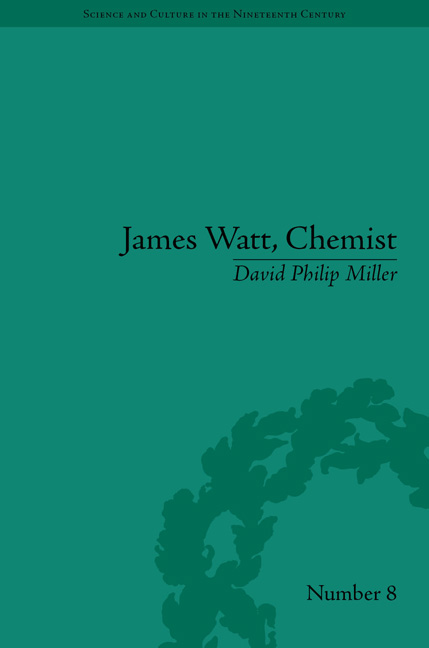Book contents
- Frontmatter
- CONTENTS
- Dedication
- Acknowledgements
- List of Figures
- Miscellaneous Frontmatter
- Introduction
- I Representations
- 1 Of Statues, Kettles and Indicators – The ‘Mechanical Watt’
- 2 The Demise of the ‘Chemical Watt’ in the Nineteenth Century
- 3 The ‘Mechanical Watt’: The Making of a ‘Philosophical Engineer’
- II Realities
- Notes
- Works Cited
- Index
2 - The Demise of the ‘Chemical Watt’ in the Nineteenth Century
from I - Representations
- Frontmatter
- CONTENTS
- Dedication
- Acknowledgements
- List of Figures
- Miscellaneous Frontmatter
- Introduction
- I Representations
- 1 Of Statues, Kettles and Indicators – The ‘Mechanical Watt’
- 2 The Demise of the ‘Chemical Watt’ in the Nineteenth Century
- 3 The ‘Mechanical Watt’: The Making of a ‘Philosophical Engineer’
- II Realities
- Notes
- Works Cited
- Index
Summary
During the course of the nineteenth century Watt's chemical work and its importance to his improvements of the steam engine were effectively obscured. There was a significant disjunction between public characterizations of Watt in the late eighteenth and very early nineteenth centuries and those extant by the early twentieth. As Watt's early reputation developed and grew, contemporary sources frequently identified him as a chemist and recognized the relevance of his chemical work to the steam engine improvements. By the early twentieth century, however, Watt's chemistry had passed from view. This is readily seen in the events and publications that celebrated the one-hundredth anniversary of his death in 1919 and the two hundredth anniversary of his birth in 1936. So, by some process, during the course of the nineteenth century the recognition of the chemical basis of Watt's steam engine improvements, especially of the first phase of them involving the separate condenser, evaporated. What was that process?
A central element in this process was the ‘water controversy’ concerning whether Watt, Cavendish or Lavoisier should be recognized as the discoverer of the compound nature of water. I have examined this controversy, and the forces that drove it, in considerable detail elsewhere. In this chapter I focus on the way in which the controversy, together with Watt's ‘self-fashioning’ in the later years of his life, radically transformed Watt's chemical reputation and in particular determined the extent to which he was recognized as a chemist at all.
Watt engaged in considerable recasting of his achievement in the years between about 1800 and his death in 1819. During the very early nineteenth century important investigations were being conducted which began to question the material theory of heat, and, even more acutely, the role of heat as a chemical substance. These were key ideas upon which Watt had built his original understanding of steam and of the steam engine. More particularly, from around 1790, a number of investigators, including Agustin de Bétancourt, Gaspard de Prony and John Dalton, conducted and published steam experiments, which in terms of methods, results and interpretation presented challenges to Watt's own.
- Type
- Chapter
- Information
- James Watt, ChemistUnderstanding the Origins of the Steam Age, pp. 33 - 58Publisher: Pickering & ChattoFirst published in: 2014



